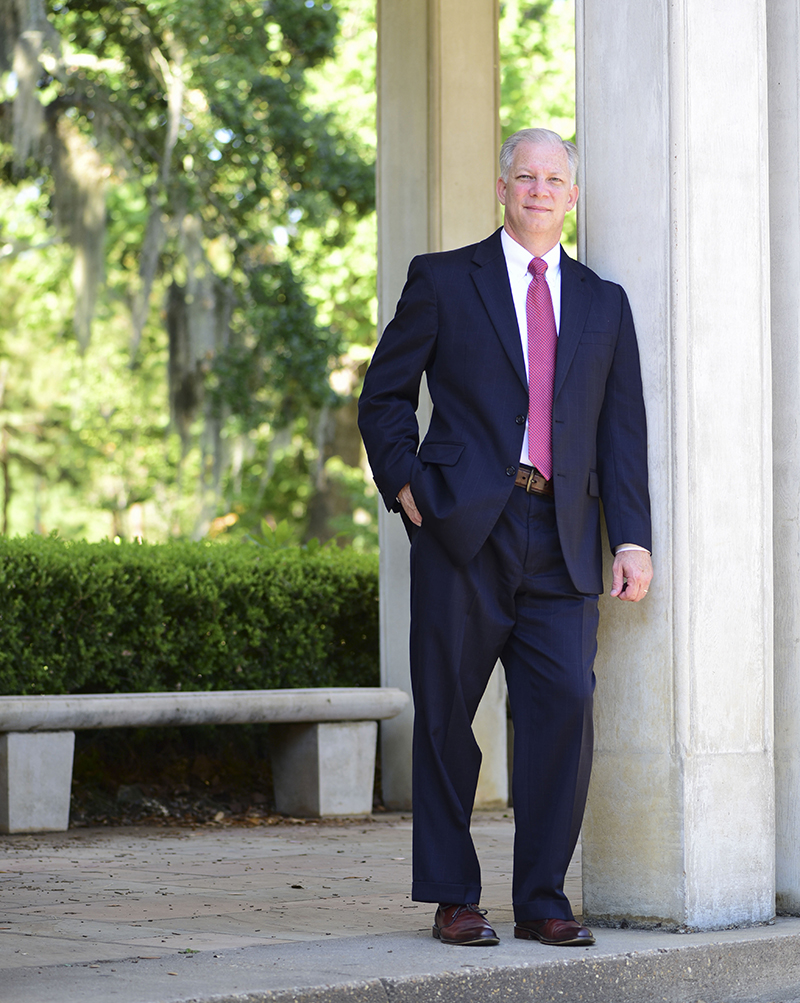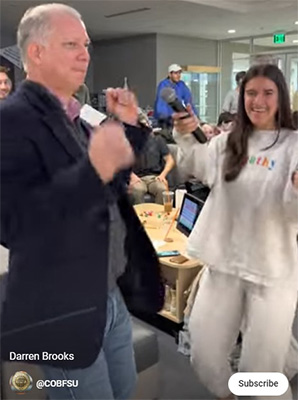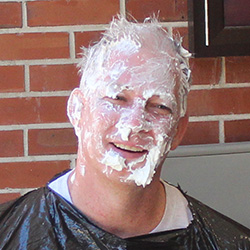'You can tell how much he cares': Brooks stresses 'competitive advantage' for MBA students
Consider the lengths to which Darren Brooks has gone to assist and promote the Florida State University College of Business. For the college and its students in recent months, he has:
- Busted a dance move to great reviews
- Simultaneously tackled multiple roles
- Gotten pies smeared in his face and liked it
"I'm having a ball," Brooks said. "I really do enjoy what I do."
But don't misunderstand: He means business.
Take his new role as director of the college's Master of Business Administration program. Faculty members tout his emphasis on ethics, critical thinking and academic rigor, and students embrace his priority on their training and marketability – with an equally personal and professional touch.
"You can tell how much he cares about our success during our studies and after our program ends," said Amanda Kahn, a full-time MBA student and president of FSU's student-led MBA Association. "When we go into Dr. Brooks' office, it's always, 'How are you doing?' and 'How are your preparations coming for after the program?'"
It's hard to miss Darren Brooks. You see him everywhere because he holds so many titles, including MBA director and a recently revised position of assistant dean for executive and professional programs. He also serves as the Barry and Janice Anderson Director of the Center for Human Resource Management and coordinator of the combined pathway that gives undergraduates majoring in human resource management a head start on an MBA.
Plus, he teaches multiple graduate-level courses that focus on topics such as organizational behavior and human resource management, training and development.
You also know Brooks for his quickness to say hello, willingness to praise and eagerness to congratulate, with a smile from here to Doak Campbell Stadium.
"He is one of the most personable professors I've encountered at Florida State," MBA student Kahn said.
William Woodyard, a senior lecturer of legal studies and real estate who teaches an MBA course that focuses on business ethics and law, said he's always impressed to see so many students staying after Brooks' MBA classes for questions and discussions.
"He's very engaging, and the students love him," Woodyard said. "I come in to teach next, with the same students, and he's a hard act to follow."
Samantha Paustian-Underdahl, the Mary Tilley Bessemer Associate Professor of Business Administration, called Brooks "an amazing person and an amazing leader."
"I'm really excited that he's taking on this role," she said. "He's bringing a lot of energy into the program – and a lot of people and companies through his contacts."
Given Brooks' upbeat – you might say rah-rah – persona, you might not be surprised to find out that he served as captain of FSU's varsity cheerleading team. He did so as he worked toward his bachelor's degree in psychology, which he earned in 1992.
He went on to earn master's and Ph.D. degrees in instructional systems and learning technologies – both also from FSU.
"Darren is a Nole through and through, and we highly value his loyalty and dedication to our college, students and faculty members and his commitment to preeminence," said Michael Hartline, dean of the college.
Hartline last fall named Brooks to succeed William Christiansen as MBA program director. Christiansen, who remains chair of the college's finance department and director of the Truist Center for Free Enterprise, championed the MBA program's rise in national rankings and "further distinguished himself" during his seven years as director, Hartline said.
"Bill left the MBA programs in great shape for Darren and our talented and dedicated faculty members to elevate to an even higher level," Hartline said.
An emphasis on relevance
Brooks trumpets the competitive edge that the program gives students under the banner of a Top 20 public university, with an innovative curriculum that aims to keep graduates a step ahead of a fast-paced and ever-changing business world.
Before joining the College of Business faculty in 2016, he spent about 20 years as an executive in state government and in the financial services and consulting industries. He thereby knows what it's like to interview recent graduates who seek a job, and he knows what hiring officials are thinking, he said.
"'They're thinking, 'How can you help make my organization better?'" Brooks said. "If you don't have the skills they need, they're going to find somebody who does. We focus on giving our MBA students the skills, expertise and professional network they need to be successful."
For Brooks, this mission informs the FSU MBA's growing emphasis on developing discrete business-ready skills through the addition of features such as micro-credentials, which visualize specific skills – perhaps a human resources expertise in job analysis or instructional design methodology or marketing research – that students can boast on their resumes and LinkedIn profiles.
He touts the college's recently expanded list of specializations – elective coursework that students can tailor to their professional needs and interests. Also, he boasts globally recognized faculty members who give students individual attention and exposure to research-based best practices and firsthand industry perspectives; and alumni and businesses that remain devoted to the college and its students.
"We strive to be relevant to the marketplace," Brooks said. "Our job is to give you a competitive advantage, so whether you're in a large or small organization, you're in a startup or you've decided to start your own business, you have those fundamentals to rely on as you advance through a company or build a business."
Daekwan Kim, the Spencer-Feheley MBA Professor, said he emphasizes creativity and innovative thinking to his students.
"Maybe we can develop the next generation of Elon Musks," he said. "We certainly want to sharpen their skills and help them do well in the business world."
Instruction also includes the relevance of the COVID-19 pandemic to students, including ways in which workplaces are changing and, in many cases, reverting to pre-pandemic policies, Brooks said.
FSU MBA specialization options – some ranked in the Top 10 nationwide – include business analytics, finance, healthcare management, human resources, marketing, management information systems, real estate, risk management and insurance, and supply chain management. The college also gets high marks for its online graduate programs for military veterans.
Students can choose to obtain an MBA in one accelerated year on campus or pursue their studies part-time, taking two courses each semester online or on campus. FSU also offers a full-time format that dovetails with a law degree and a part-time option that pairs with graduate studies in social work.
'What can we do better?'
The program in the fall served almost 800 students, including about 500 online and more than 100 in its evening format. Brooks emphasized that regardless of format, students get the same full-time faculty.
The program aims for "growth at a responsible pace," he said.
"I never want to outgrow our ability to support our students," Brooks said. "Dean Hartline has been very supportive. The same goes for President Richard McCullough, who wants to know how he can support our growth."
Three pillars define Brooks' vision. They are academic rigor, which includes a constant review of ways in which the MBA programs challenge students; collaboration through networks that include peer groups, alumni, faculty members and corporate partners; and service in the spirit of giving back, "whether that's doing a food drive or some sort of community service. Or it could be supporting another university entity that runs a program that's benefiting a significant number of people and needs help because they're not businesspeople."
As MBA director, Brooks said, "I have to continuously challenge myself, and ask, "What are we doing? How are we doing it? And what can we do better?'"
That includes support for students, often with an emphasis on collaboration and team-building.
Late last year, Brooks organized an MBA Team Bowling Challenge to help full-time students relax and get to know each other before the holiday break. The rules required students to bowl, depending on the frame, with their opposite hand; while sitting cross-legged; and after performing "a silly dance move," among other innovative deliveries.
"To build a strong student culture," Brooks explained, "it is important to provide them opportunities to engage each other outside the classroom, to relax, have fun and enjoy being a part of this program."
A video from the bowling event showed Brooks mastering his own dance move, to rousing applause from MBA students.
He'll even take a pie in the face … actually, dozens of pies in the face. He did that last year during a charity fundraiser that included fellow faculty targets Allen Blay, chair of the accounting department; Luke Hopkins, director of the Seneff Honors Program and the Center for Professional Success; and Keith Ferguson, entrepreneur in residence in the Rockwood School of Marketing.
Brooks' response: Awesome – thank you!
"Thank you to all who participated and supported the fundraiser for our MBA student association," Brooks wrote on LinkedIn, with a video that shows him and his colleagues repeatedly getting creamed.
MBA candidate Christian Saylor responded on LinkedIn to Brooks' post: "Couldn't ask for a better director! Always there for us when we need you."
-- Pete Reinwald




